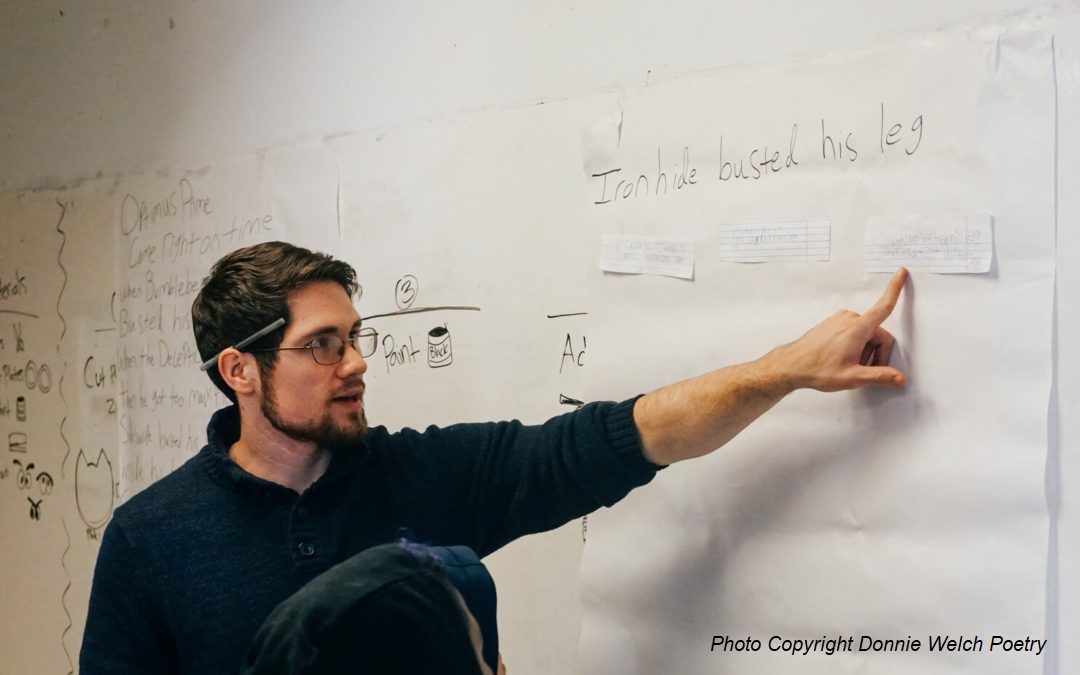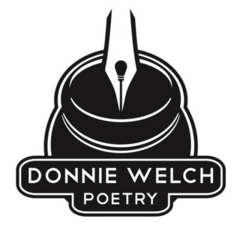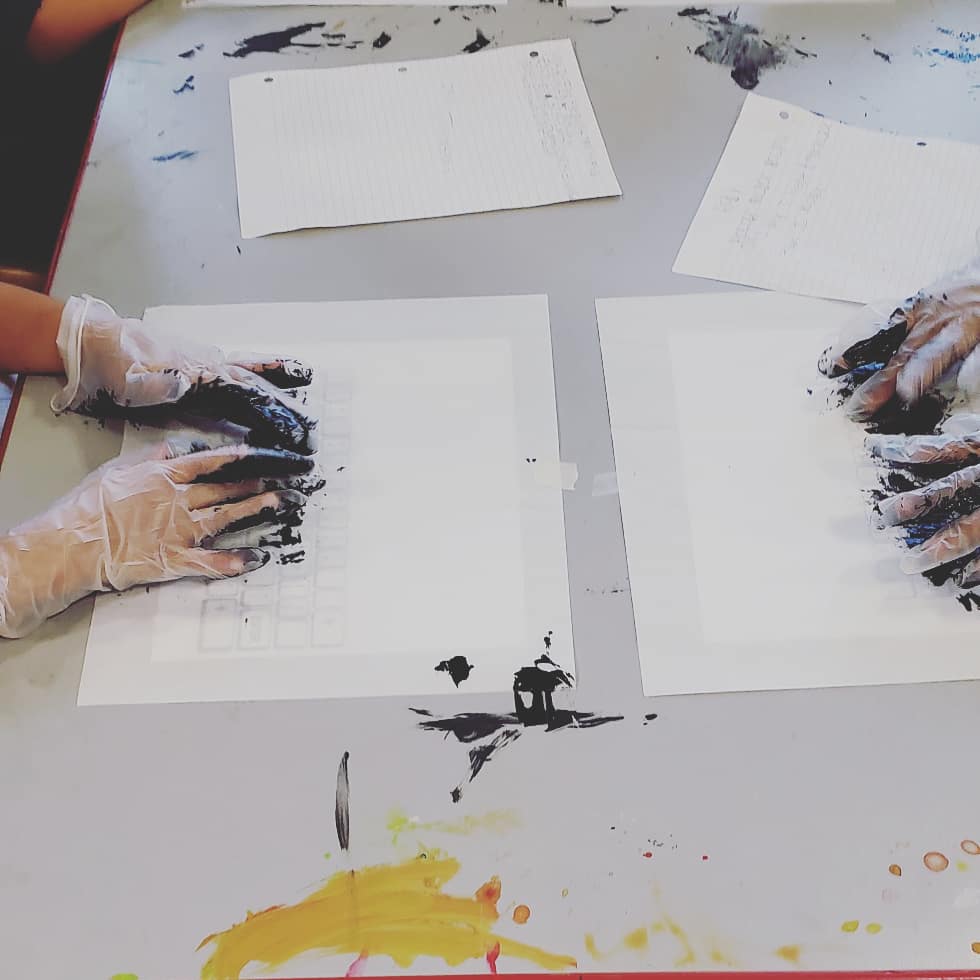Donnie Welch joins us today. He is a Poet and Educator who runs poetry workshops around New York City for students with developmental disabilities. He is the Creative Writing Teacher at the Rebecca School in Manhattan. The poetry workshops that he does started there where he began his career as a teaching assistant. The poetry workshop programs really grew from a Developmental, Individual differences, Relationship-based (DIR) foundation.
Sensory and Developmental Poetry Workshops with Donnie Welch
Donnie’s poetry workshops are not the typical poetry workshop where everyone sits around a table with their Fine Arts degrees at a college or university setting, lead by a professor, focusing on readings from a poet or two, giving critiques about the writing. Donnie’s workshops do focus on sharing space and giving someone attention and time while taking the time to find your own voice. But he also uses three core tenants: 1. Movement helps us understand rhythm, 2. Rhythm helps us understand poetry, and 3. Poetry helps us understand each other.
A Donnie Welch Poetry Workshop
The workshop will start with some movement. It might engage your fine motor system such as your digits, your fingertips, or small eye muscles, or your gross motor system that engages your larger muscle groups such arms and legs. Poetry has a lot of rhythm and musicality in it, he says, whether it’s formal, free verse, or slam (spoken work). He’s taking this fundamental aspect of poetry and turning it into a sensory experience.
When he comes into a room with a group of students, he might not know where each person is developmentally, but he knows everyone can work to make some kind of rhythm, either by clapping or with the help of an aid. It creates a shared space where they create a repetitive rhythm to regulate and engage a calm response. When he gets that foundational aspect of poetry, he will look into exploring language.
The poets in the above image are typing stories and poems special education primary students wrote (that’s tracing paper and below that is a print out of keyboard) to create a piece of visual poetry in response artwork in the Bronx Museum of the Arts.
He likes to keep his groups between 5 and 10 kids and the sweet spot is around 8 kids. He can get some good robust socialization with this size. He might start by writing a couplet (two lines of poetry that often rhyme) on the board such as “Optimus Prime came right on time” because the Transformers were a topic of interest for many students.
He will use note cards where students can write successive lines. He asks them to keep in mind the rhythm of “1..2..3..4..” The structuring of it is where the back-and-forth comes in. Everyone puts their card on the board and they decide together the order in which the lines are placed in the poem.
The end-product is a collaborative poem where everyone gets their part and gets to share their ideas. It can take upwards of a month or two to make it happen and it is process-oriented.
Different Developmental Levels and Abilities
Once Donnie has the group regulated, then gets the shared attention and engagement leading to the back-and-forth interaction, he can work on social problem-solving when they create their poem together as a group which proceeds into creating emotional ideas and expressions. It’s a wonderful way to work developmentally. Donnie adds that as with any Floortime, he has to have flexibility as the facilitator.
Donnie adds that as with any Floortime, he has to have flexibility as the facilitator. He works with children that range in age from 3 to 21 at Rebecca School, so he might start with a musical chair idea where everyone can move while he rhymes using a lot of affect, “There was an old lady who swallowed a fly. I don’t know why she swallowed a fly. Perhaps… she’ll… die.” Then everyone will know to stop.
Learn more about Donnie’s Sensory Reading Starter Kit in the video above and learn more at his Patreon page here.
The next step, developmentally, might be to ad lib on those words: “There was an old ____ who _____.” Eventually, the goal would be to write their own poems without the scaffolding. Each session takes its own form depending on the individual differences of the students in the space. Donnie said that some kids will be scripting lines that are meaningful to them, and he will invite the speech and language therapists, along with occupational therapists, psychologists, etc. He will use their input to inform his practice.
Finding the Student’s Voice
For Donnie, these workshops are an exploration of voice in terms of self-expression and self-advocacy. He says that creativity is an activity for daily living in and of itself, so he wants to provide the space to practice self-expression creatively so they can have the ability to ask for a raise in their job one day, for instance. He wants to create a space for the poets who enter to feel safe to say what they want and what they need, so if they want to script Disney lines, that’s cool and that’s welcome in the poem they’re making all together.
This is really about following the child’s interests. Then next time the same student might say a different Disney line and again they’ll validate it and say that’s welcome. As the student feels safe and validated by what they say being heard and validated, Donnie says beautiful things begin to happen. I asked Donnie to give us an example of some of these beautiful things he sees.
The Rebecca School has a yearly education theme called “All about me” which is about exploring the self, self-confidence, self-awareness, and self-advocacy–all the things Donnie likes to work on already. With the middle-years students who are in the earlier developmental capacities, he uses the picture book I Like Myself by Karen Beaumont which is rhythmic with amazing artwork by David Catrow. It starts something like, “I like myself. I’m glad I’m me. There’s no one else I’d rather be.” Donnie then turns it around and talks about what the classroom likes.
Donnie gives the example that whenever the page with the lion comes up, one girl will whisper, “Simba“, connecting her experience to her joy watching Disney. But recently the staff asked Donnie to help with Mother’s Day cards. They read the Llama Llama Red Pajama book. When they got to the writing they talked about things they like to do with their mothers. Instead of saying Simba, she said “Going to Grandma’s house“, which was a tender opening of her and her expression. She, for the first time, was able to express something genuine. It’s such shared joy with the student but also so rewarding as a staff member to see the fruits of the work they do everyday.
Developmental Progress
Donnie gets to see the stages from a young child through middle school and high school age. Donnie had started with a student about four years back as a teacher’s assistant. During a poetry session during a parent visiting day, the student shared his drawing of a student stabbing another student who was bleeding all over. Donnie thought he would lose his job! This year the same student is in the developmental group that is publishing their own poetry book. This poet wrote a sonnet for the book about all the things he loves and cares about in the world. Now this student is graduating.
Floortime allows children to practice real life consequences and express their desires to vent. It is necessary to release pent-up emotions by providing this outlet through play which allows them to adapt and move forward. If we thwart their expression, they won’t be able to move forward, even if the topic is scary like talking about a person being stabbed and bleeding. Poetry is word play, Donnie says. Poetry will provide a wonderful outlet for some students, while others might gravitate towards musical expression, etc.
All arts education should be developmental work, Donnie says. You can’t correct for creativity. You can’t force someone to write poetry. But if they come to you and are interested in expressing themselves in this way, we can provide these opportunities for them.
Donnie Welch Poetry Training
Donnie trains other educators, provides webinars, and is happy to travel to train others. He has a Patreon page where you can find out more if you are interested in his products or having him train you or your staff.
Thank you to Donnie Welch for taking the time to share his wonderful developmental work with us! You can support his efforts through his Patreon page, check out his Instagram page or his YouTube channel, and share this post to help spread the word about these fantastic workshops on Facebook or Twitter. Also if you have questions, comments, or related experiences to share, please feel free to do so in the Comments section below.
Until next time, here’s to affecting autism through playful interactions!





